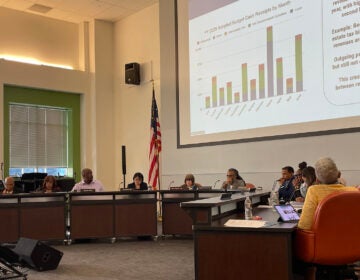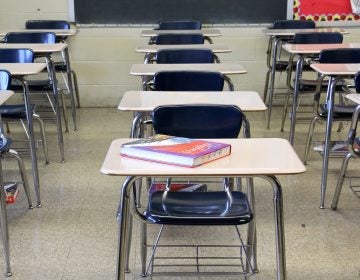Philly schools chief says cash will run out by end of January

Superintendent William Hite writes that after Jan. 29, 'our ability to keep schools open, issue paychecks and pay bills is uncertain.' (NewsWorks file photo)
The Philadelphia School District may not be able to pay its employees or its bills after January 29, 2016.
Superintendent William Hite sent a letter to employees Tuesday evening explaining this would be the consequence of Pennsylvania’s ongoing state budget impasse.
The district – which relies on the state for about half of its funding – has not received any money from Harrisburg for this school year.
To make up for that loss, the district has borrowed more than half a billion dollars to date — saddling the cash-strapped district with $2.5 million in additional debt obligations.
District officials say there’s additional costs as well — counting the toll that chronically under-resourced classrooms take on students, teachers and public perception.
The Erie School District has threatened to close its doors because of the budget impasse. The Bethlehem School District, among others, has cut payments to charter schools. Districts far and wide who haven’t yet needed to borrow have dwindled their rainy day reserves.
Almost six months beyond the June 30 budget deadline, Gov. Tom Wolf and Republican leaders in the House and Senate have watched two framework agreements fall apart.
The latest — which would pay for a $400 million boost to K-12 public education by charging sales tax on items now exempt – found resistance among rank-and-file House Republicans after leaders reached agreement.
The larger framework agreement, which has the blessing of Wolf and the state Senate, also includes compromises on proposed changes to amend the state pension and liquor systems.
A new pension system would lessen guaranteed retirement funds for future state employees by splitting funds between a defined benefit pension system and a defined contribution 401(k) style investment.
The deal also includes provisions to allow wine to be sold in supermarkets.
The framework agreement also includes a few changes to the school code that have raised the ire of Philadelphia’s education advocates, including Hite and School Reform Commission Chair Marjorie Neff.
In addition to a slew of measures that would strip districts of some of their authority over charter schools, the code bill calls for state takeover of five Philadelphia schools per year.
Neff and Hite expressed concern that these provisions could undercut the district’s finances and soon wash away the gains it would see from the new education funding infusion.
Under the framework deal, Philadelphia stands to see a $100 million boost — an increase that nearly makes up for the annual funding lost when the state eliminated the “charter reimbursement” line-item.
That funding, which recognized that added, systemic costs of charter schools, was cut in the first budget passed during former Gov. Tom Corbett’s tenure.
Below is Hite’s letter.
Dear Colleagues:
In light of the state budget impasse, I would like to update you on our financial situation.
Our goal throughout the budget talks has been to keep educating students for as long as possible. At this point, we can continue to make payroll, operating without state funds, through January 29, 2016. After that date, our ability to keep schools open, issue paychecks and pay bills is uncertain.
The prospect of running out of operating funds is dire. We are exploring all options for contingency planning with our lenders and considering possibilities across many fronts to provide for students’ uninterrupted education. We will also provide financial planning information to employees in the near future. We will continue to communicate with you in the weeks ahead.
Please continue contacting the Legislature and Governor, and advocate for a budget that provides the critical support all Pennsylvania students deserve.
Sincerely,
William R. Hite, Jr.SuperintendentThe School District of Philadelphia
WHYY is your source for fact-based, in-depth journalism and information. As a nonprofit organization, we rely on financial support from readers like you. Please give today.





